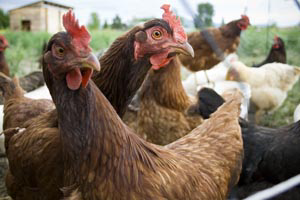Breeding for feather pecking behaviour

During the past decades, poultry breeders have successfully improved the production performance, either egg production in layers or meat production in broilers.
Due to consumer’s concern aspects of animal welfare in breeding programs have gained importance. In laying hens, animal welfare is focused on feather pecking behaviour, as this is not only a welfare but also a serious economic problem, less production, high mortality.
Because of a ban on the use of beak trimming in some European countries, feather pecking is becoming a substantial problem in the layer industry. The feather condition score (FCS) as a measure of feather damage has been shown to be closely related to feather pecking behaviour in laying hens housed in groups.
To obtain a better understanding of genetic and other biological mechanisms underlying feather pecking behaviour, data on FCS of a population of 2,724 female offspring from crossing 50 male W1 and 907 female WB purebred lines were used. The offspring of 25 sires were beak-trimmed, and the offspring of another 25 sires were non-beak-trimmed. Titers of plasma natural antibody (NAb) isotypes IgM and IgG binding keyhole limpet hemocyanin at 24 wk of age were measured. Feather condition was scored at 53 wk of age.
The estimated associative genetic variance was substantial, however, associative effects for FCS were not statistically significant in both populations. More data is needed to confirm these findings.
Source: Y. Sun, E.D. Ellen, J.J. van der Poel. H.K. Parmentier and P. Bijma, Poultry Science 93












